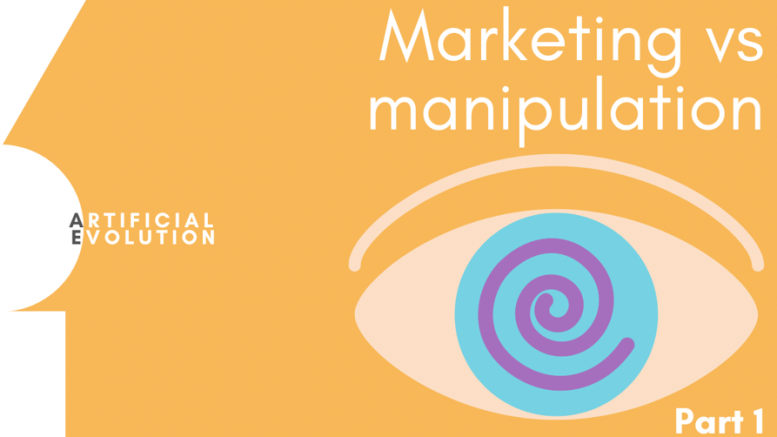Author’s note: I’ve been off for a while. Have taken on a few new challenges that got me detracted from writing. Hopefully this topic, although controversial, allows you, the reader, to get context on which side of the line you stand on. Or is it allland?
Splitting the difference
Some say that all marketers are liars, that all selling is deception, that all persuasion is manipulation. Of course, manipulation techniques are many, as marketers can be brilliant and creative. Some people call these techniques marketing and merchandising, and others consider them manipulation.
The thing is though – its not that simple. When I target affluent parents of 19-25 year olds who’s kids may have entered media schools for NAVIC’s programs, I do it so I can get the right audience to see my ad – not because I think that they’ll be the easiest to influence.
Americus Reed, Professor of Marketing at the University of Pennsylvania had a chat about this with BigThink
(Please see the chat here
The ethics question
Does it matter if the individual desires a specific brand? Is it the job of a marketer to steer them in a specific direction? Does direct targeting and segmenting audiences with message repetition sound like manipulation? Are we being told what to buy? Has the power of choice been reduced for the customer?
Yes and no. And it depends where you stand on each.
There are somethings that are definitely off the books – forced purchases due to monopolies, bait and switch tactics, flooding your Instagram and Twitter followers with bots and fake engagement and the like.
Just. You know, don’t do It.
As marketers, it is our job to convince people – whether that is by choosing a particular product or buying from a particular supplier.
When it comes to ethics in marketing, there are two major dangers: deception and manipulation. My point is simply this: ethics in marketing gets complicated quickly, and much of this comes down to intention. Most of the marketing classes I teach begin with the debate over whether marketers are fulfilling needs, or creating needs in order to sell products. In reality, the marketers job is better than the prospects at knowing who needs their products, and why.
There’s a popular social experiment with reference to the classic Jordan Belford question: Sell me this pen.
The argument posed by Belford is simply to ask questions: What are their values, how much to they buy pens for usually, do they even need pens?
The goal of the argument is simple.
Don’t sell.
Find out if they need it.
Sales, in it’s most basic form is targeting an audience that is already looking for the product.
Keisha Brewer, CEO of PR Alliance, gives her perspective on this
Communities and such
The only way to build an enthusiastic following: sell products to them, and build trust. Community strength is usually measured with interaction, repeat customers and digital engagement. The thing is though, the road to rapid community growth often boils down to 1 principle:
Wild claims.
This is true across community oriented brands and projects and well, other collectives (see: cults & religious and nationalist extremism). The wilder the claim, the more the belief. This is especially true in the Web3 world where pictures of apes and more recently Goblins, have made a lot of money for the NFT creators.
“You’re now hynotised. You will now do as I say.”
To sway purchase decisions, marketers employ either conventional manipulative techniques or subtle, subconscious messages. Of course, manipulation techniques are many, as marketers can be brilliant and creative.
Some people call these techniques marketing and merchandising, and others consider them manipulation. Like most things that are done well, marketing manipulation quickly turns bad in the wrong hands. It is the only way to build an enthusiastic following, sell products to them, and build trust. On the other hand, there are times when someone knows that his products are not good for the people he is selling it to, uses a non-manipulative method of selling it.
Next week, we’ll talk about a few case studies and discuss 4 formats of marketing that sit on the border (and sometimes cross) the lines of ethics.
Stay curious. Stay Secure.
See you next week.
The views and opinions published here belong to the author and do not necessarily reflect the views and opinions of the publisher.



I’ve been into marketing for a while (IT, Fintech content for Contenteam) and I think you’re right about finding out the needs. I always feel puzzled when someone is insisting on selling me anything, so I never use this approach in my work. We want to indicate the product or service exist, but we do not want to be intrusive with this.